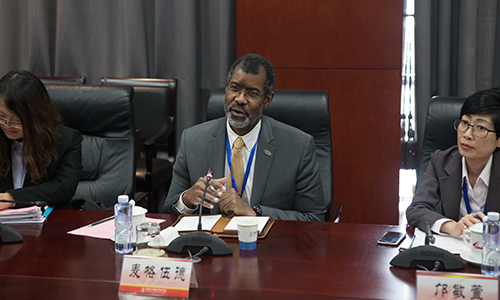
NEA Director‑General Mr William D. Magwood, IV and senior staff visited the People's Republic of China on 7‑9 November 2018 for a series of meetings with various ministries and institutions, including the Ministry of Ecology and Environment (MEE)/National Nuclear Safety Administration (NNSA), the China Atomic Energy Authority (CAEA), and the National Energy Administration of China (C/NEA). Technical visits were also made to the China Institute of Atomic Energy (CIAE) and the Sanmen Nuclear Power Plant, where the world's first AP1000 third-generation nuclear reactor (Sanmen 1) is now connected to the grid. Discussions with the Chinese authorities covered a wide range of issues, including the electricity markets in China, nuclear safety culture, safety case for the disposal of radioactive waste, decommissioning and legacy management, stakeholder involvement and small modular reactors. Underlining the enhanced technical co-operation between the two parties, the first NEA-China Forum will be held in May 2019 with a focus on radioactive waste management and decommissioning.
Accident Tolerant Fuels:
Prospects and Possibilities
The NEA hosted a webinar on 20 November 2018 to discuss the key findings of the recently published State‑of‑the‑Art Report on Light Water Reactor Accident‑Tolerant Fuels, as well as the ongoing advanced fuel research and technologies currently being developed around the world. The report reviews the most promising advanced fuel and cladding concepts in terms of their fundamental properties and behaviour under normal and accidental conditions, maturity of technologies, supporting R&D activities, experimental data and modelling results. If you missed the webinar, you can watch the video recording at oe.cd/nea-atf-webinar-2018.
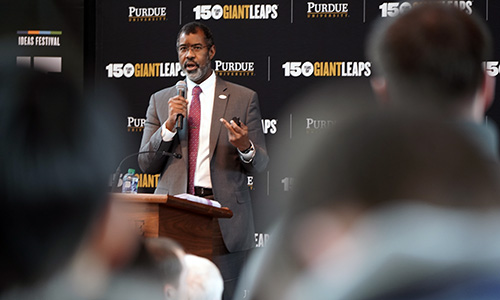
NEA Director-General Magwood visited Purdue University in Indiana, United States, on 6 December 2018 and delivered a lecture as part of the Engineering Distinguished Lecturer series organised by Purdue School of Nuclear Engineering. During his lecture, Mr Magwood discussed the current state of and prospects for nuclear energy on the path towards a low-carbon energy future.
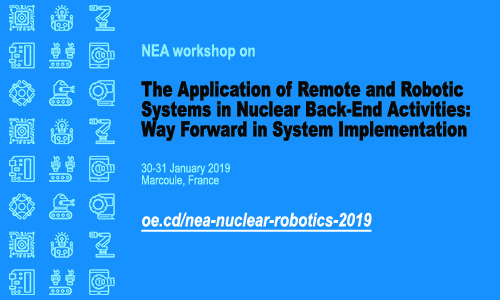 Register now: The application of remote and robotic systems in nuclear back-end activities
Register now: The application of remote and robotic systems in nuclear back-end activitiesThe NEA will organise a workshop on the application of remote and robotic systems in nuclear back-end activities on 30-31 January 2019 in Marcoule, France. The purpose of this workshop is to facilitate the exchange of information among those interested in developing and implementing remote and robotic systems for radioactive waste management and decommissioning projects. Participants will be invited to discuss possible approaches to forging a common understanding on approaches to the development and application of robotic and remote systems through dialogue at the international level. For more information on the workshop and to register, see oe.cd/nea-nuclear-robotics-2019.
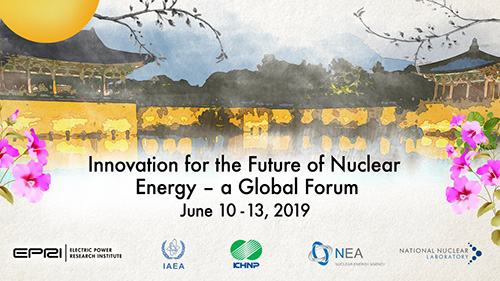 Global Forum on Innovation for the Future of Nuclear Energy
Global Forum on Innovation for the Future of Nuclear EnergyThe NEA is pleased to co-operate with the Electric Power Research Institute (EPRI), the International Atomic Energy Agency (IAEA), Korea Hydro & Nuclear Power (KHNP) and the United Kingdom National Nuclear Laboratory (NNL) to organise a Global Forum on Innovation for the Future of Nuclear Energy in Gyeongju, Korea, on 10-13 June 2019. The forum will bring nuclear power plant leaders, regulators and technology providers from around the world together in a collaborative environment to determine how innovative solutions can be more rapidly implemented in operating plants. It will focus on accelerating deployment of innovative solutions to address the most urgent challenges facing the current global fleet of nuclear power plants. Registration information is available at www.globalnuclearinnovation.com.
Safety of nuclear installations
The NEA Committee on the Safety of Nuclear Installations (CSNI) held its biannual meeting on 5‑6 December 2018 to discuss new tasks, joint research projects and reports. The committee approved a number of reports, including a technical opinion paper on the use of probabilistic safety analysis for fire events at nuclear plants, a report summarising an improved process for validating the function of new or improved plant control rooms, and a state-of-the-art report on fuel behaviour in loss-of-coolant accidents. In addition, the committee discussed the importance of preserving databases and experimental datasets that are essential for supporting nuclear safety, and identified follow-up actions in this regard. The meeting also featured a presentation by Mr Naomi Hirose, former President of Tokyo Electric Power Company (TEPCO), on the nuclear safety reform initiatives undertaken in the aftermath of the Fukushima Daiichi nuclear power plant accident.
Nuclear regulatory activities
At its biannual meeting on 3-4 December 2018, the NEA Committee on Nuclear Regulatory Activities (CNRA) discussed and approved the release of the following reports: the proceedings of the 2018 International Nuclear Regulatory Inspection Workshop held in Germany; the proceedings of the 2017 International Workshop on Operating Experience (OPEX) held in Spain; "Neutronics and criticality safety for sodium fast reactors"; "Fuel qualification for sodium fast reactors"; the consensus position on the qualification of instrumentation and control (I&C) platforms for use in systems important to safety; the consensus position on data communication independence; and "Nuclear regulatory organisations and the evolving use of social media as a communication tool". Additionally, the committee endorsed holding a workshop on human capital on 5 June 2019. The workshop will be organised jointly by the NEA, the World Association of Nuclear Operators (WANO) and the International Atomic Energy Agency (IAEA). The meeting also included a special topical discussion on ageing management of nuclear power plants, featuring presentations by the European Nuclear Safety Regulators Group (ENSREG), Canada, Japan and the United States.
 Nuclear supply chain management
Nuclear supply chain management
The CNRA and the Multinational Design Evaluation Program (MDEP) Vendor Inspection Co-operation Working Group (VICWG) held an international workshop on nuclear supply chain management on 5-6 November 2018. The workshop brought together more than 100 experts from 15 countries, representing regulatory bodies, standard development organisations, technical support organisations, international organisations and the industry. Participants addressed a variety of topics, including counterfeit, fraudulent and suspect items (CFSI), early integration of safety culture into the supply chain, regulatory approaches to commercial grade dedication and international co‑operation in preparation for new technologies. Participants discussed the primary supply chain oversight challenges in an increasingly globalised nuclear industry, identified emerging risks and provided recommendations to further improve supply chain management and oversight arrangements. The CNRA and the MDEP VICWG will consider integrating the key workshop conclusions into their programmes of work.
 NEA expert appointed to ASN Scientific Committee
NEA expert appointed to ASN Scientific Committee
Dr Edward (Ted) Lazo, Deputy Head of the NEA Division of Radiological Protection and Human Aspects of Nuclear Safety, has been appointed to a four-year term as a member of the French Nuclear Safety Authority (ASN) Scientific Committee. The nine-member body is responsible for making proposals and recommendations with regard to the research needs in support of regulatory decisions. It is made up of recognised experts in the fields of nuclear safety and radiological protection. The NEA congratulates Dr Lazo, who has been with the NEA for over twenty years, for this recognition of his excellent scientific work with, and for the NEA committees.
 Communicating the safety case
Communicating the safety case
Communicating with stakeholders about highly technical information relating to the safety case for deep geological repositories has proved a challenge in many NEA member countries. After the failure of the deep geological repository (DGR) siting in 2007, the Government of Japan revised its policy on the DGR programme and started playing an active role in building confidence in public institutions. The NEA Integration Group for the Safety Case (IGSC) and the NEA Forum of Stakeholder Confidence (FSC)> worked with Japan to address this challenge, and jointly published the 2017 report on Communication on the Safety Case for a Deep Geological Repository. To further address this issue, Japan's Ministry of Economy, Trade and Industry (METI) and the NEA co-organised the International Workshop on Deepening Comprehension on Safety Case on Deep Geological Repository and Public Confidence on Japan’s DGR Programme. The workshop took place in Japan on 28-30 November 2018 with more than 80 Japanese experts and 12 international experts who exchanged experiences, lessons learnt and best practices.
Evidence, analyses and arguments that a deep geological repository will be safe have to be provided within a safety case. Compiling the safety case for a deep geological repository is a highly technical undertaking involving a number of scientific disciplines, as well as the principles and mathematics of engineering and design. Yet it is the stakeholders and the public that will be asked to accept that a proposed repository will be safe during its lifetime and long afterwards. The challenge is to communicate the case for safety in plain language which accurately reflects the outcome of the many technical studies, analyses and calculations. The NEA report Communication on the Safety Case for a Deep Geological Repository presents the lessons learnt in order to guide ongoing stakeholder communication efforts by implementers and regulators. Download the report at oe.cd/1NJ.
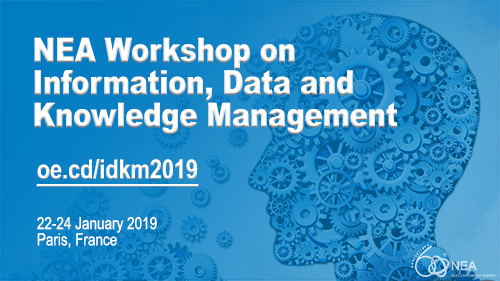 Register now:
Register now:The NEA has long recognised the importance of IDKM due to the long duration of radioactive waste management, the volume of interrelated information, data and knowledge produced, and the need to preserve and transfer this to future generations. To this end, it has been working on three initiatives: the Preservation of Records, Knowledge and Memory Across Generations (RK&M), the Radioactive Waste Repository Metadata Management (RepMet), and the Expert Group on Waste Inventorying and Reporting Methodology (EGIRM). To present the outcomes of these initiatives, the NEA will organise a workshop on Information, Data and Knowledge Management (IDKM) on 22‑24 January 2019 in Paris, France. The workshop will explore the needs and challenges in managing information, data and knowledge for radioactive waste management organisations, regulators and other stakeholders. For more information and registration, visit oe.cd/idkm2019.
 Effective characterisation of unconventional and legacy waste
Effective characterisation of unconventional and legacy waste
The development of a reliable and efficient characterisation and categorisation methodology is a common challenge for many NEA member countries in the fields of post-accident radioactive waste management and legacy waste management. In this respect, the NEA Expert Group on Characterisation Methodology on Unconventional and Legacy Waste (EGCUL) was established earlier this year to share state-of-the-art knowledge and experience in characterisation for a large amount of unknown waste, as well as to discuss relevant issues and challenges on characterisation in member countries. The group held its first ever meeting in Fukushima, Japan, on 26 November 2018. Following the meeting, group members visited the Fukushima Daiichi Nuclear Power Station, Japan Atomic Energy Agency's Okuma Analysis and Research Center, the Collaborative Laboratories for Advanced Decommissioning Science (CLADS) and the Naraha Center for Remote Control Technology Development in order to learn more about the Fukushima Daiichi Decommissioning Project and the latest developments in remote systems for decommissioning.
 Nuclear innovation roadmapping
Nuclear innovation roadmapping
towards a low-carbon energy future
The Nuclear Innovation 2050 (NI2050) Advisory Panel held its final meeting on 22-24 November 2018. The panel was established shortly after the launch of the NI2050 initiative in 2015 to guide the roadmapping of nuclear fission R&D priorities in order to foster innovation and thereby enable nuclear energy to play its role in a low-carbon energy future. Over the past several years, the panel guided the work of experts involved in the NI2050 initiative and led to three outcomes: (1) a compilation of ongoing nuclear R&D programmes in NEA member countries; (2) a better understanding of barriers for innovation in the nuclear sector; (3) a methodology to select priority topics and to develop corresponding roadmaps. Nine such roadmaps have been developed and are now ready to proceed to the next phase of the initiative. In its next phase, the NI2050 is expected to become an incubator for additional ideas for nuclear innovation and to develop those ideas towards implementation.
 Better policies for mining regions
Better policies for mining regions
Mining regions have the potential to attract investment and jobs, which is a prerequisite to meet the increasing global demand for minerals and metals. The NEA, which periodically conducts studies and analyses on uranium mining, participated in the Second OECD Meeting of Mining Regions and Cities on 20-24 November 2018. Hosted by Australia in Darwin, the meeting highlighted policies to improve economic development, environmental needs and well-being outcomes from mining and mineral resources industries. It provided a global platform for an exchange among governments, the industry and local populations to support the implementation of better policies for mining regions and cities. It also featured a site visit to the Gulkula mine, a small-scale bauxite operation in East Arnhem Land which aims to deliver sustainable economic benefits to local indigenous Yolngu people and to provide them with training and job opportunities in the mining industry.
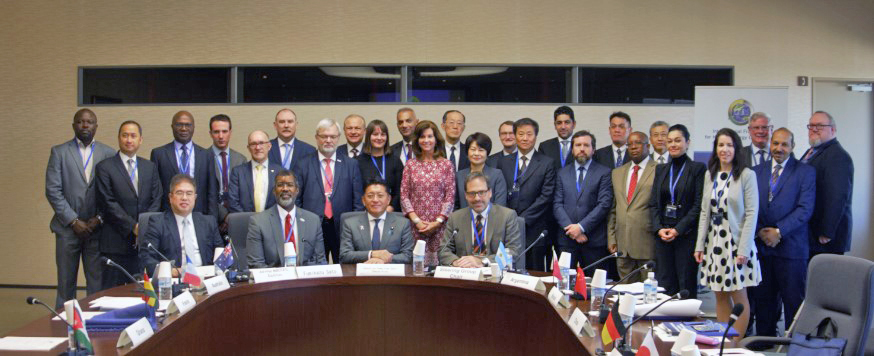
IFNEC Executive Committee meets in Japan
The Executive Committee of the International Framework for Nuclear Energy Cooperation (IFNEC) met in Tokyo, Japan, on 15 November 2018 with 26 IFNEC member countries and observer organisations represented. The meeting featured opening remarks by Minister Takuya Hirai and a keynote lecture by Dr Yoshiaki Oka, Chairman of the Japan Atomic Energy Commission. Chaired by Japan, the Executive Committee approved an updated version of the IFNEC governance, issued a joint statement and endorsed the nomination of new Steering Group Vice-Chairs from Kenya, the Russian Federation and the United States. Earlier in the week, IFNEC also held a meeting on nuclear safety culture, as well as a conference on challenges and opportunities facing nuclear energy. Co-sponsored by the Nuclear Innovation Clean Energy Future (NICE Future) initiative, the conference brought together more than 130 participants and covered a variety of topics including electricity markets, financing, non-electric applications of nuclear energy, innovation and stakeholder involvement.
NEA participates in the UNECE International Forum on Energy for Sustainable Development
The NEA participated in the Ninth International Forum on Energy for Sustainable Development, organised by the United Nations Economic Commission for Europe (UNECE) in Kiev, Ukraine on 9‑12 November 2018. The annual forum addresses the implications of a transition toward low-carbon energy systems and reviews the progress made towards the UN sustainable development goals. The NEA took part in the session on "Nuclear Energy and Sustainable Development: Role in Decarbonised Energy Mix", which was the first-ever nuclear energy-related session organised at the forum. The session addressed the technical and economic impacts of decarbonising the power system with high shares of nuclear and renewable technologies, as well as investment challenges for low-carbon technologies under deep decarbonisation scenarios. The Forum concluded that (i) the world is not on track to meet the target of the Paris Agreement to limit global warming to well below 2°C; (ii) it is imperative to address the environmental footprint of fossil fuels immediately; (iii) decarbonisation will require contributions from all low-carbon technologies.
 NLC celebrates centenary issue of the Nuclear Law Bulletin
NLC celebrates centenary issue of the Nuclear Law Bulletin
On 21-22 November 2018, the NEA Nuclear Law Committee (NLC) held its biannual meeting during which the NEA Office of Legal Counsel and each NLC working party presented updates on their programme of work and ongoing activities. The meeting was attended by 76 participants, representing 25 NEA member countries, five non-NEA member countries, the International Atomic Energy Agency (IAEA), the European Commission (EC) and the insurance industry. Participants discussed priority rules and nuclear third party liability, the licensing framework and third party liability regime applicable to fusion projects, and recent developments with regard to the international legal framework for public participation. Reports on the latest national developments in nuclear law were provided by Brazil, China, Japan, Switzerland, Turkey, Ukraine and the United Arab Emirates. The meeting also included a special session to celebrate the 50th anniversary and the 100th issue of the Nuclear Law Bulletin, which featured former heads of NEA legal affairs who discussed the relevance and future of this unique publication.
 Legal aspects of nuclear safety
Legal aspects of nuclear safety
The NEA Working Party on the Legal Aspects of Nuclear Safety (WPLANS) held a meeting on 23 November 2018 with representatives from 17 NEA member and non-member countries. The meeting featured presentations on a number of topics, including the licensing of small modular reactors (SMRs) and legal challenges to nuclear safety decisions. During this meeting, the participants also discussed a draft report on the long‑term operation of nuclear power reactors.
 Nuclear liability and transport
Nuclear liability and transport
The NEA Working Party on Nuclear Liability and Transport (WPNLT) met on 20 November 2018 with 36 representatives from 13 member countries, as well as from 11 non-NEA member countries, the European Commission (EC), the IAEA, the insurance industry and the World Nuclear Transport Institute (WNTI). The meeting included presentations by the EC on the latest developments with regard to the Directive 2006/117/Euratom on the supervision and control of shipments of radioactive waste and spent fuel, and a presentation by the nuclear insurance pools representative on their activities related to transport. The group focused on potential deliverables to allow the public to access useful information regarding nuclear liability as applicable to transport, and addressed practical issues by discussing a case study.
 NEA participates in the International Nuclear Law Association Congress
NEA participates in the International Nuclear Law Association Congress
From 4 to 8 November 2018, the NEA co-sponsored and participated in the 23rd Nuclear Inter Jura Congress, "International Co-operation in Nuclear – Sustainability, Excellence & Innovation", which took place in Abu Dhabi, United Arab Emirates. Organised by the International Nuclear Law Association (INLA), in co-operation with the Emirates Nuclear Energy Corporation (ENEC), the congress brought together experts and practitioners from all over the world to discuss contemporary issues in nuclear law, including safety and security questions, safeguards, liability and financing. As part of the conference programme, the NEA provided presentations on the international nuclear liability instruments, nuclear safety and international emergency response.
 Applications closing soon for the
Applications closing soon for theThe five-day NEA International Nuclear Law Essentials (INLE) course aims to provide participants with a comprehensive understanding of the various interrelated legal issues relating to the safe, efficient and secure use of nuclear energy. This intensive course has been designed to accommodate the needs and interests of lawyers working in either the public or the private sectors but will also be of interest to scientists, engineers, policymakers, managers and other professionals working in the nuclear field. The next session of the INLE will take place on 18-22 February 2019. For more information on the course and to apply, see oe.cd/INLE.
 NEA Nuclear Data Week 2018
NEA Nuclear Data Week 2018
The NEA Data Bank hosted its biannual Nuclear Data Week on 28-30 November 2018 to promote co-operation among experimentalists, nuclear data evaluators and end users of nuclear data. Organised within the framework of the Joint Evaluated Fission and Fusion (JEFF) project, NEA Nuclear Data Week aims at fostering ties among various nuclear data expert communities. In conjunction with the event, the NEA Working Party on International Nuclear Data Evaluation Co-operation (WPEC) subgroups also held meetings. JEFF will organise a stakeholders' meeting on 6-7 June 2019 to review the existing needs and motivation and to drive the development of new nuclear data libraries.
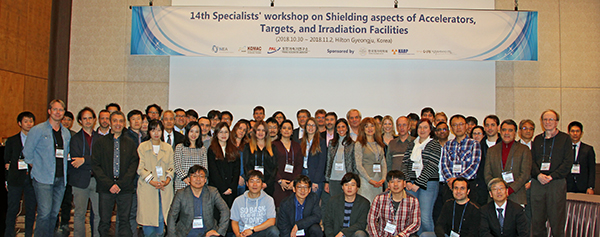
Shielding aspects of accelerators, targets, and irradiation facilities
The 14th NEA Specialists' workshop on Shielding Aspects of Accelerators, Targets, and Irradiation Facilities (SATIF-14) was held in Korea from 30 October to 2 November 2018. Hosted jointly by Korea Multi-purpose Accelerator Complex (KOMAC) and Pohang Accelerator Laboratory (PAL), the event brought together 63 experts from 10 countries and two international organisations. Participants addressed various subjects, including source terms and connected topics, shielding and dosimetry, beam-plasma and laser-plasma interactions and acceleration, medical and industrial accelerators, induced radioactivity, code status, benchmarking and inter-comparison. SATIF-15 will be held in September 2020 in Michigan, United States.
An online archive of previous editions is available here.
The monthly bulletin only lists new and updated material. It is distributed by e-mail to registered users of the Nuclear Energy Agency's Online Services. Registration is free; please use this link.